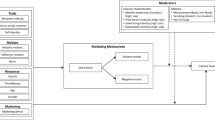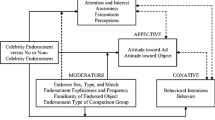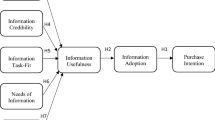Abstract
The role of expectations in consumer evaluation of outcomes is widely applied in the study of consumers’ postpurchase evaluations. However, the evaluative consequence of relatively unexpected outcomes has received little attention. This study discusses the importance of infrequently occurring negative outcomes in consumer evaluations and then tests the role of their foreseeability in an attributional model. Results suggest that the extent to which a consumer anticipates negative product use outcomes plays an important role in mediating attributions for that outcome to the marketer. Specifically, the model results address determinants of consumer attributions of blame for negative consumption outcomes. Factors such as promoting safety, using warning labels, and providing service as well as consumer risk aversion, product experience, and perceived product danger influence blame both directly and indirectly through the extent to which an unlikely negative outcome is anticipated.
Similar content being viewed by others
References
Babin, Barry J., Mitch Griffin, and William R. Darden. 1994. “An Empirical Comparison of Alternative Conceptualizations of Postconsumption Reactions.”Journal of Consumer Satisfaction/Dissatisfaction and Complaining Behavior 7: 172–183.
Baron, Reuben M. and David A. Kenny. 1986. “The Moderator-Mediator Variable Distinction in Social Psychological Research: Conceptual, Strategic, and Statistical Consideration.”Journal of Personality and Social Psychology 51 (July): 1173–1182.
Burger, Jerry M. 1981. “Motivational Biases in the Attribution of Responsibility for an Accident: A Meta-Analysis of the Defensive Attribution Hypothesis.”Psychological Bulletin 90 (3): 496–512.
Celsi, Richard L., Randall L. Rose, and Thomas W. Leigh. 1993. “An Exploration of High-Risk Leisure Consumption Through Skydiving.”Journal of Consumer Research 20 (June): 1–23.
Darby, M. R. and E. Karni. 1973. “Free Competition and the Optimal Amount of Fraud.”Journal of Law and Economics 16 (April): 67–86.
Folkes, Valerie S. 1984. “Consumer Reactions to Product Failure: An Attributional Approach.”Journal of Consumer Research 10 (March): 398–409.
————— 1988. “Recent Attribution Research in Consumer Behavior: A Review and New Directions.”Journal of Consumer Research 14 (March): 548–565.
—————, Susan Koletsky, and John Graham. 1987. “A Field Study of Causal Inferences and Consumer Reaction: The View From the Airport.”Journal of Consumer Research 13 (March): 534–539.
————— and Barbara Kotsos. 1986. “Buyers’ and Sellers’ Explanations for Product Failure: Who Done It.”Journal of Consumer Research 50 (April): 74–80.
Fornell, Claes and David Larcker. 1981. “Evaluating Structural Equation Models With Unobservable Variables and Measurement Error.”Journal of Marketing Research 18 (February): 39–50.
Gardial, Sarah Fisher, D. Scott Clemons, Robert B. Woodruff, David W. Schumann, and Mary Jane Burns. 1994. “Comparing Consumers’ Recall of Prepurchase and Postpurchase Product Evaluation Experiences.”Journal of Consumer Research 20 (March): 548–560.
Griffin, Mitch, Barry J. Babin, and William R. Darden. 1992. “Consumer Assessments of Responsibility for Product-Related Injuries: The Impact of Regulations, Warnings, and Promotional Policies.” InAdvances in Consumer Research. Vol. 19. Eds. John F. Sherry, Jr. and Brian Sternthal. Provo, UT: Association for Consumer Research, 577–581.
Herr, Paul M., Frank R. Kardes, and John Kim. 1991. “Effects of Word-of-Mouth and Product-Attribute Information on Persuasion.”Journal of Consumer Research 17 (March): 458–462.
Howard, Daniel J. and Thomas E. Barry. 1990. “The Evaluative Consequences of Experiencing Unexpected Favorable Events.”Journal of Marketing Research 27 (February): 51–60.
Jolibert, Alain J. P. and Robert A. Peterson. 1976. “Causal Attributions of Product Failure: An Exploratory Investigation.”Journal of the Academy of Marketing Science 4: 446–455.
Kamins, Michael A. and Henry Assael. 1987. “Two-Sided Versus One-Sided Appeals: A Cognitive Perspective on Argumentation, Source Derogation, and the Effect of Disconfirming Trial on Belief Change.”Journal of Marketing Research 24 (February): 29–39.
Kelley, Harold H. 1967. “Attribution Theory in Social Psychology.” InNebraska Symposium on Motivation. Ed. David Levine. Lincoln: University of Nebraska Press, 192–237.
————— 1973. “The Process of Causal Attribution.”American Psychologist 28 (February): 107–128.
————— and John L. Michela. 1980. “Attribution Theory and Research.”Annual Review of Psychology 31: 457–501.
LaTour, Stephen A. and Nancy C. Peat. 1980. “Conceptual and Methodological Issues in Consumer Satisfaction Research.” InAdvances in Consumer Research. Vol. 7. Ed. Jerry C. Olson. Ann Arbor, MI: Association for Consumer Research, 431–437.
Mergenhagen, Paula. 1995. “Product Liability: Who Sues?”American Demographics 17 (June): 48–55.
Mizerski, Richard W. 1982. “An Attribution Explanation of the Disproportionate Influence of Unfavorable Information.”Journal of Consumer Research 9 (December): 301–310.
—————, Linda L. Golden, and Jerome B. Kernan. 1979. “The Attribution Process in Consumer Decision Making.”Journal of Consumer Research 6 (September): 123–140.
Morgan, Fred W. 1982. “Marketing and Product Liability: A Review and Update.”Journal of Marketing 46 (Summer): 69–78.
————— 1988. “Liability of Services Marketers for Client Injuries.” InSouthwestern Marketing Association 1988 Conference Proceedings. Eds. P. J. Gordon and B. J. Kellerman. Cape Girardeau: Southeastern Missouri State University.
----- and Karl A. Boedecker. 1980–1981. “The Role of Personal Selling in Product Liability Litigation.”Journal of Personal Selling and Sales Management (Fall/Winter): 34–40.
Nelson, P. 1974. “Advertising as Information.”Journal of Political Economy 81 (July/August): 729–754.
Oliver, Richard L. 1980. “A Cognitive Model of the Antecedents and Consequences of Satisfaction Decisions.”Journal of Marketing Research 17 (November): 460–469.
————— 1989. “Processing of the Satisfaction Response in Consumption: A Suggested Framework and Research Propositions.”Journal of Consumer Satisfaction, Dissatisfaction and Complaining Behavior 2: 1–16.
————— 1993. “Cognitive, Affective, and Attribute Bases of the Satisfaction Response.”Journal of Consumer Research 20 (December): 418–430.
————— and Wayne S. Desarbo. 1988. “Response Determinants in Satisfaction Judgments.”Journal of Consumer Research 14 (March): 495–507.
Pyszczynski, Thomas A. and Jeff Greenberg. 1981. “Role of Disconfirmed Expectancies in the Instigation of Attributional Processing.”Journal of Personality and Social Psychology 40 (January): 31–38.
Rethans, Arno J. and Gerald S. Albaum. 1981. “Towards Determinants of Acceptable Risk: The Case of Product Risks.” InAdvances in Consumer Research. Vol. 8. Ed. Kent B. Monroe. Ann Arbor, MI: Association for Consumer Research, 506–510.
Richins, Marsha. 1984. “Word of Mouth Communication as Negative Information.” InAdvances in Consumer Research. Ed. Thomas C. Kinnear. Provo, UT: Association for Consumer Research, 250–255.
—————. 1985. “The Role of Product Importance in Complaint Initiation.” InConsumer Satisfaction/Dissatisfaction and Complaining Behavior. Eds. K. Hunt and R. Day. Bloomington: Indiana University Press, 50–53.
Ross, Lee, D. Greene, and P. House. 1977. “The False Consensus Effect: An Egocentric Bias in Social Perception and Attribution Processes.”Journal of Experimental Social Psychology 34 (November): 930–937.
Russell, Dan. 1982. “The Causal Dimension Scale: A Measure of How Individuals Perceive Causes.”Journal of Personality and Social Psychology 42 (June): 1137–1145.
Shaver, Kelly G. 1970. “Defensive Attribution: Effects of Severity and Relevance on the Responsibility Assigned for an Accident.”Journal of Personality and Social Psychology 34 (November): 930–937.
Short, James F., Jr. 1984. “The Social Fabric at Risk: Toward the Social Transformation of Risk Analysis.”American Sociological Review 49 (December): 711–725.
Stayman, Douglas M., Dana L. Alden, and Karen H. Smith. 1992. “Some Effects of Schematic Processing on Consumer Expectations and Disconfirmation Judgments.”Journal of Consumer Research 19 (September): 240–255.
Sujan, Mita. 1985. “Consumer Knowledge: Effects on Evaluation Strategies Mediating Consumer Judgments.”Journal of Consumer Research 12 (June): 31–46.
Tse, David K. and Peter C. Wilton. 1988. “Models of Consumer Satisfaction Formation: An Extension.”Journal of Marketing Research 25 (May): 204–212.
Tversky, Amos and Daniel Kahneman. 1981. “The Framing of Decisions and the Psychology of Choice.”Science 211: 453–458.
Valle, Valerie A. and Melanie Wallendorf. 1977. “Consumer Attributions of the Cause of Their Product Satisfaction and Dissatisfaction.” InConsumer Satisfaction, Dissatisfaction and Complaining Behavior. Ed. Ralph L. Day. Bloomington: Indiana University Press, 26–30.
Vaughn, Mark. 1990. “Getting a Grip on the U.S. Market.”AutoWeek 40 (October 8): 21.
Weiner, Bernard. 1982. “The Emotional Consequences of Causal Ascriptions.” InAffect and Cognition: The 17th Annual Carnegie Symposium on Cognition. Eds. M. S. Clark and S. T. Fiske. Hillsdale, NJ: Lawrence Erlbaum, 185–200.
—————. 1985a. “An Attributional Theory of Achievement Motivation and Emotion.”Psychological Review 92 (October): 548–573.
—————. 1985b. “‘Spontaneous’ Causal Thinking.”Psychological Bulletin 97 (1): 74–84.
—————. 1986.An Attributional Theory of Motivation and Emotion. New York: Springer-Verlag.
Zeithaml, Valarie A., Leonard L. Berry, and A. Parasuraman. 1993. “The Nature and Determinants of Customer Expectations of Service.”Journal of the Academy of Marketing Science 21 (Winter): 1–12.
Zuckerman, M. 1971. “Dimensions of Sensation Seeking.”Journal of Consulting and Clinical Psychology 36: 35–52.
Author information
Authors and Affiliations
Additional information
His expertise is in the area of product safety and consumer reactions to negative information. His research has appeared in theJournal of Consumer Research, Journal of the Academy of Marketing Science, Journal of Consumer Affairs, Advances in Consumer Research, and numerous other national and regional publications.
His expertise is in the area of consumers’ affective reactions and research methodology. His work has appeared in theJournal of Consumer Research, Journal of the Academy of Marketing Science, Journal of Retailing, Journal of Business Research, Advances in Consumer Research, and numerous other professional outlets.
Her academic interests are focused on consumer behavior and retailing, and she has been recognized with both college and university teaching awards in these areas. Her research has appeared in theJournal of Consumer Satisfaction/Dissatisfaction and Complaining Behavior, Advances in Consumer Research, The Cutting Edge, and numerous other national and regional publications.
Rights and permissions
About this article
Cite this article
Griffin, M., Babin, B.J. & Attaway, J.S. Anticipation of injurious consumption outcomes and its impact on consumer attributions of blame. JAMS 24, 314–327 (1996). https://doi.org/10.1177/0092070396244003
Issue Date:
DOI: https://doi.org/10.1177/0092070396244003




